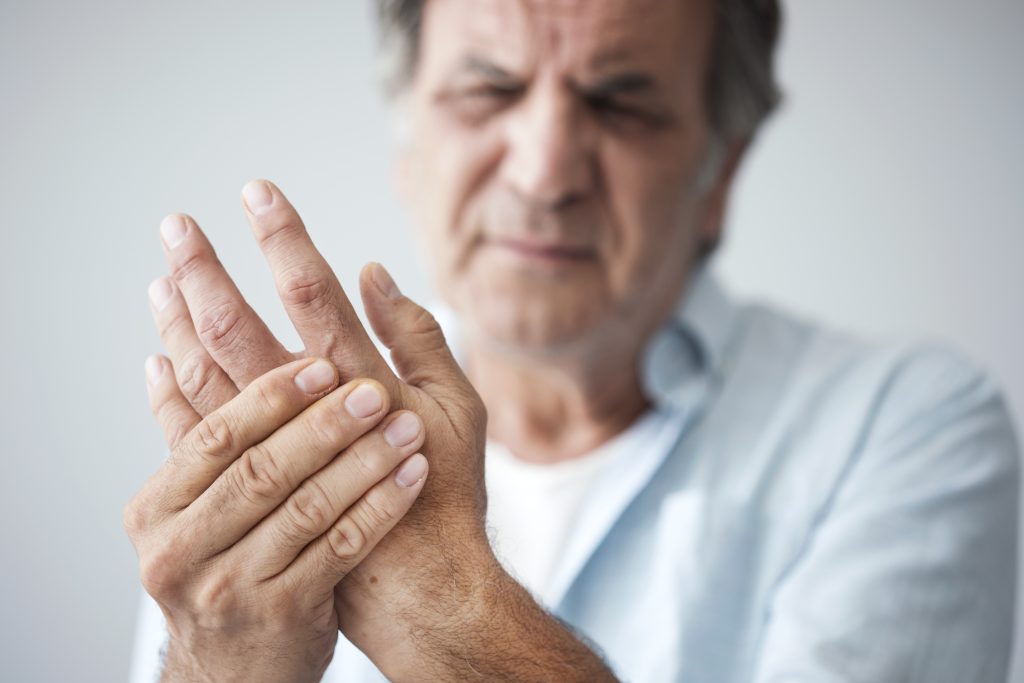How we can help you beat arthritis.
- If you are battling regular joint pain and swelling, but you’re not sure if you have arthritis, contact Family Medicine.
- If you are unable to enjoy your favorite sport because of joint discomfort, contact Sports Medicine.
- If you are struggling to do daily tasks because of shoulder, knee, or hip pain, a joint replacement may be necessary.
- Do you suffer from chronic back pain? Contact our Orthopedic Spine specialist.
- Do you want to keep your joints moving to minimize arthritis pain and progression? Contact Physical Therapy & Rehabilitation.
- Are you struggling to enjoy life because of more advanced arthritic pain? Our Orthopedics Specialists can help.
- Are you battling the chronic pain of fibromyalgia or experiencing severe weakness. Our Neurology Specialists can help.
- Are you looking for ways to improve your arthritis symptoms? Changes in diet can help, so reach out to our Nutrition Therapy.
What is Arthritis?
Joint pain isn’t the only thing that arthritis can cause. It’s a complicated disease that can change many parts of your life.
Contrary to popular belief, Arthritis is not a disease of aging. It affects people of all ages, races and genders, and it can range from mild to severe.
Arthritis can come and go. When battling arthritis, it can make it hard to do many things, like walk or climb stairs, as well as enjoy sports, hobbies or spend time with family and friends. Symptoms vary from person to person, but swelling, pain, stiffness, and limited joint movement are common.
Arthritis can leave lasting changes in your joints, whether it’s swelling or changes only seen in X-rays. Plus, certain types can affect your heart, eyes, lungs, kidneys, and skin. That’s why catching it early and getting the right care is key to keeping your health and quality of life in check.
If you have a medical emergency, call 911 or visit the NMC Health Medical Center Emergency Department.
The Two Most Common Types of Arthritis
Osteoarthritis
Osteoarthritis (OA) is a common condition that affects the joints in people of all ages. It’s sometimes referred to as “wear and tear” arthritis because it often develops over time as the cartilage in the joints wears down.
Joint pain, stiffness, and swelling are the most common signs of OA. These effects are most common in weight-bearing joints like the knees, hips, and back. It could also happen to your hands and feet.
Rheumatoid Arthritis
An autoimmune disease called rheumatoid arthritis (RA) mostly affects the joints, making them swell and hurt. OA is caused by joints wearing down over time. RA, on the other hand, is caused by the immune system fighting the body’s own tissues.
RA is known to affect women more than men. Its signs include pain, swelling, stiffness, and warmth in the joints, most often in the small joints of the hands, wrists, and feet. You might also feel tired, have a fever, and lose weight.
RA can damage and change the shape of joints over time. Also, it can hurt other body parts, like the eyes, heart, and lungs.
Other Types of Arthritis or Related Disorders
Gout
When uric acid crystals build up in the joints, they can be very painful, swell up, and turn red. This is called gout. It happens most often in the joint at the base of the big toe, but it can also happen in the ankles, knees, elbows, wrists, and fingers.
Psoriatic Arthritis (PsA)
Some people who have psoriasis, a long-term skin disease, also have psoriatic arthritis. People who already have psoriasis are more likely to get psoriatic arthritis, but it can also happen to people who have never had psoriasis.
Psoriatic arthritis can make joints hurt, become stiff, and swell up. This can happen most often in the lower back, wrists, ankles, fingers, and toes. It can hurt the health of your nails. You might also feel tired and have eyes and/or tendons swell up.
Juvenile Idiopathic Arthritis (JIA)
Juvenile idiopathic arthritis is the most common type of arthritis in children under the age of 16. It is a chronic autoimmune disease marked by joint swelling that lasts for six weeks or more without any clear cause.
Fibromyalgia
Fibromyalgia can have widespread joint pain that mirrors arthritis. However, it is a chronic condition known for causing widespread pain and tenderness all over the body, along with symptoms like fatigue, trouble sleeping, and problems with thinking. Unlike arthritis, current research indicates that fibromyalgia is related to how your nerves signal pain. Considered a pain disorder, our experts at Neurology Specialists can help you find answers about fibromyalgia.
Lupus
Lupus and arthritis share some common symptoms, but lupus is not a form or arthritis. Instead, it is a chronic autoimmune disease that can affect various parts of the body, including the skin, joints, kidneys, heart, lungs, brain, and blood cells. Lupus occurs when the immune system becomes overactive and attacks healthy tissues and organs, leading to swelling, pain, and damage.
Lupus may come and go over time. Other symptoms can include fatigue, skin, fever, chest pain, hair loss, sensitivity to sunlight, mouth sores, and swollen lymph nodes. Infusion therapy is sometimes used to treat lupus.
Arthritis FAQs
If you think you may have arthritis, talk with your doctor. Make notes of your symptoms, including when they started, how severe they are, any factors that make you feel better or worse, and any other relevant info. This can help your healthcare provider make an accurate diagnosis.
Diagnosis usually involves a physical exam, medical history review, blood tests, and imaging tests such as X-rays, ultrasounds, or MRIs to assess joint damage.
Treatment usually aims to manage symptoms, reduce swelling, prevent joint damage, and improve your quality of life. Your treatment plan will depend on your type of arthritis, how severe it is, and your age, overall health, and lifestyle.
Your treatment may include medicines, physical therapy , lifestyle changes – including nutrition therapy , and/or surgery.
Managing arthritis is an ongoing process, and it may take time to find the right mixture of treatments and self-care strategies that work best for you.
- Choose low-impact ways to stay active, such as walking, swimming, or cycling.
- Maintain a healthy weight so your joints aren’t too strained.
- Seek support from family, friends, support groups, or health experts who understand what you’re going through and can provide encouragement and advice.
- Talk with your doctor about other treatments to reduce pain, minimize joint damage, and improve or maintain your quality of life.
Arthritis Library

3 Festive Holiday Fitness Ideas to Stay Active and Healthy



